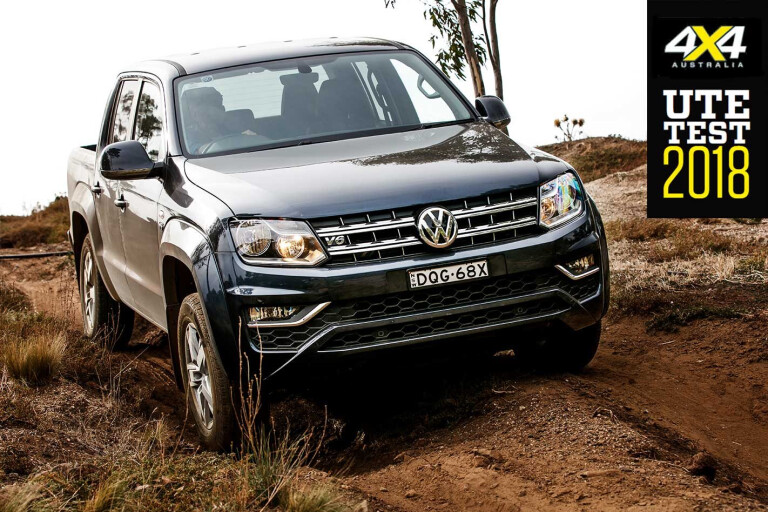
THE Amarok is the oldest ute here (2010); although, it only gained its 3.0-litre V6 diesel in late 2016. For its part the V6 engine actually dates back to 2004 and is a VW family (Audi) design used in various Porsche, Audi and VW models.
For use in the Amarok it has been detuned and, at the same time, strengthened in the bottom end, to help accommodate its new ‘working’ or commercial vehicle role. The V6 is only available at this stage with an automatic transmission and single-range full-time 4WD.
WHAT YOU GET
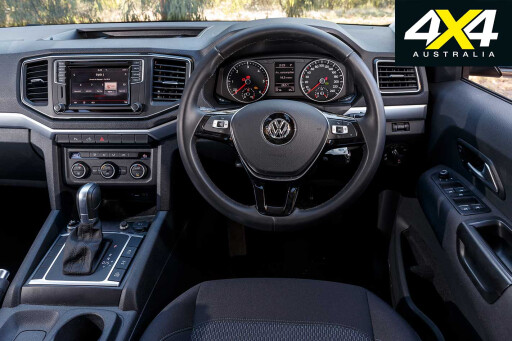 THE Sportline is the cheapest Amarok V6 model. Standard kit includes front and front-side airbags (but no airbags in the rear), tilt-and-reach steering wheel adjustment, and four-wheel disc brakes – also standard with four-cylinder Amaroks.
THE Sportline is the cheapest Amarok V6 model. Standard kit includes front and front-side airbags (but no airbags in the rear), tilt-and-reach steering wheel adjustment, and four-wheel disc brakes – also standard with four-cylinder Amaroks.
The Sportline V6 has dual-zone climate, front and rear parking sensors, a rear-view camera, Apple CarPlay, 18-inch alloys, and a 12V outlet and lighting for the tray. Unlike the dearer Highline V6, the Sportline doesn’t have sat-nav, side steps, sports bar, tyre-pressure monitoring, bi-Xexon headlights and LED daytime-running lights.
POWERTRAIN AND PERFORMANCE
DETUNED is a relative word here, as the Amarok’s V6 still cranks out at least 165kW and as much as 180kW. Compare that to the next best power figure, the 147kW of the Ranger, BT-50 and Colorado.
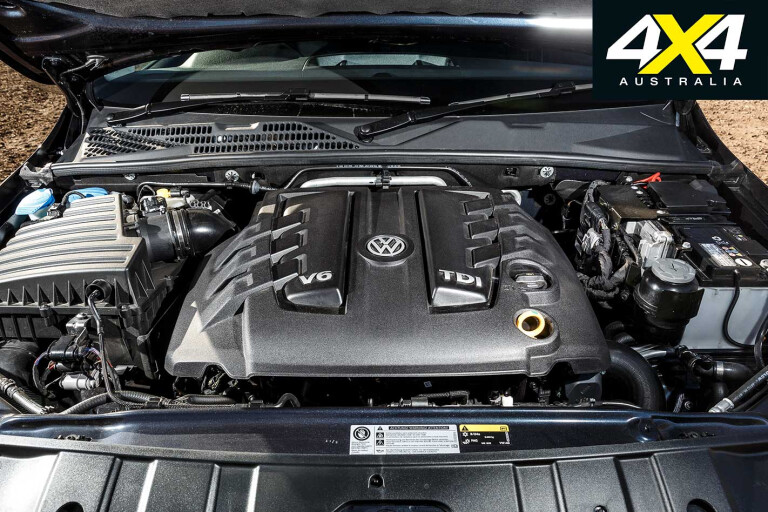
Then throw in the closer ratios and quick shifting of the Amarok’s eight-speed automatic, combined with relatively short final drive gearing, and it’s “see you later” in any sort of side-by-side performance contest. In this company it’s Amarok first, daylight second.
The 180kW is via an overboost function that operates at 70 per cent or more throttle in third and fourth gears, the crucial on-road performance and highway-overtaking gears. Not that you’d know it’s happening – the transition from 165kW to 180kW is totally seamless.
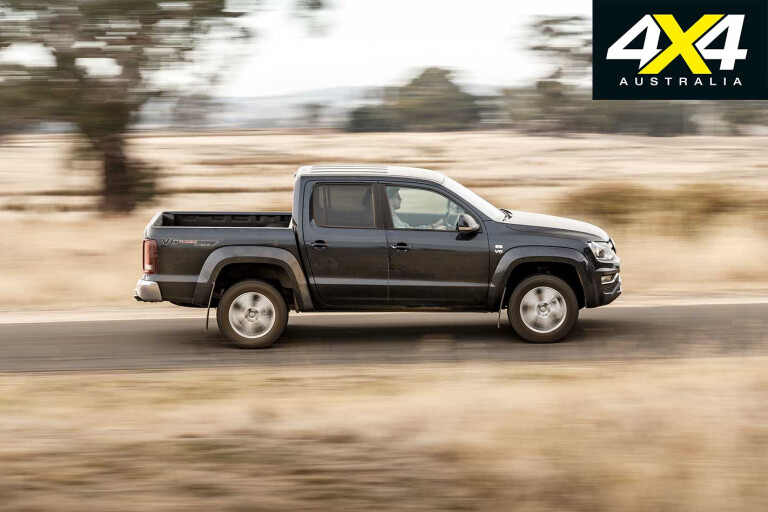
Equally impressive is the V6’s bottom-end torque, with its class-whipping 550Nm on tap from just 1500rpm. That’s more off-idle than even the bigger capacity (3.2-litre) engines in Ranger and BT-50. Combine this low-rpm grunt with willingness to rev and the V6 offers a potent wide-rpm flexibility that no other engine here can match.
All the while the V6’s refinement and noise control is the best of any engine here and, along with the eight-speed auto (the slickest gearbox here) it gives the Amarok a unique luxury-car feel in this company.
ON-ROAD RIDE AND HANDLING
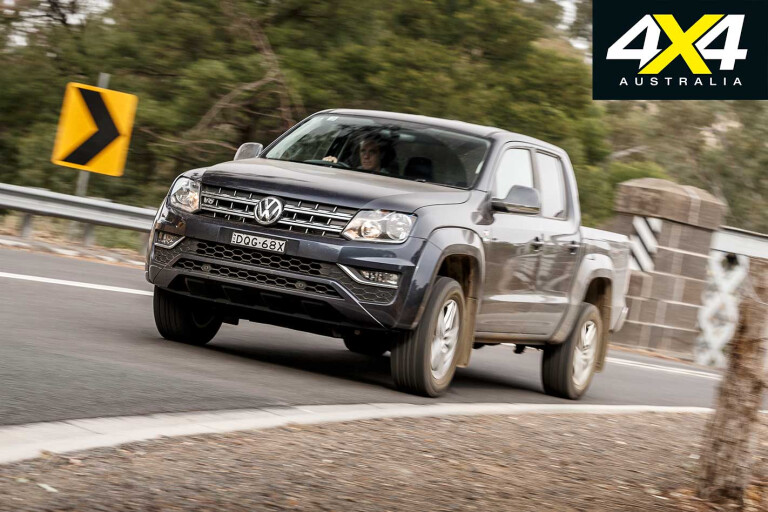
FULL-TIME 4x4 is the Amarok’s on-road trump card and something that sets it well aside from the other utes here, Triton excepted. In any conditions aside from dead-dry sealed roads, full-time 4x4 offers grip, safety and driveability advantages.
To all this the Amarok adds quality suspension that generally feels plush in this company, communicative steering, and the ‘feel’ of a much smaller ute, to provide a driving confidence like no other. As we have noted before, the Amarok feels like a “rally car” compared to the other utes.
OFF-ROAD
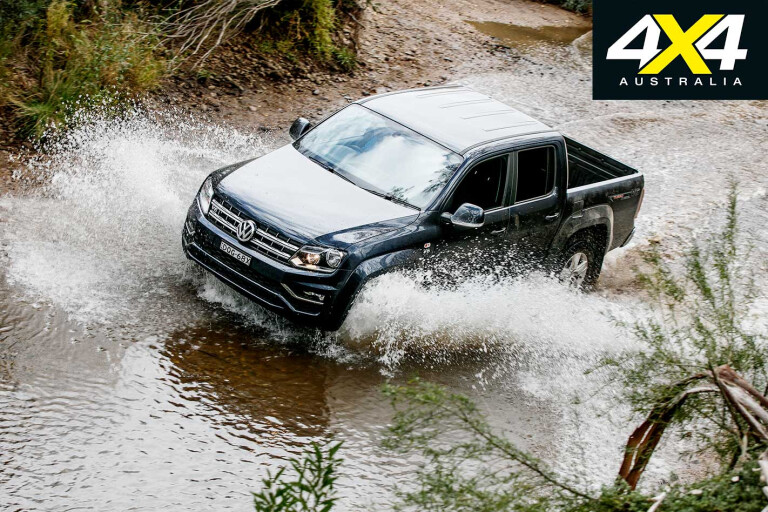
WITHOUT a two-speed, high- and low-range transfer case, you might think the Amarok’s star would fade off-road, but that’s not the case. In fact, nowhere near it, as the Amarok offers top-shelf off-road ability (matched only by Hilux and Ranger) with an ease-of-use that puts it well out on its own.
The Amarok’s number-one party trick is that it can go from whizzing down a freeway at whatever speed you dare, to climbing a gnarly off-road hill without having to touch a button or lever. It’s that simple and clever, as it’s always in 4x4. The centre diff locks automatically and it gets by without low-range, thanks to a relatively low first gear in the eight-speed automatic and the special calibration of the torque convertor.
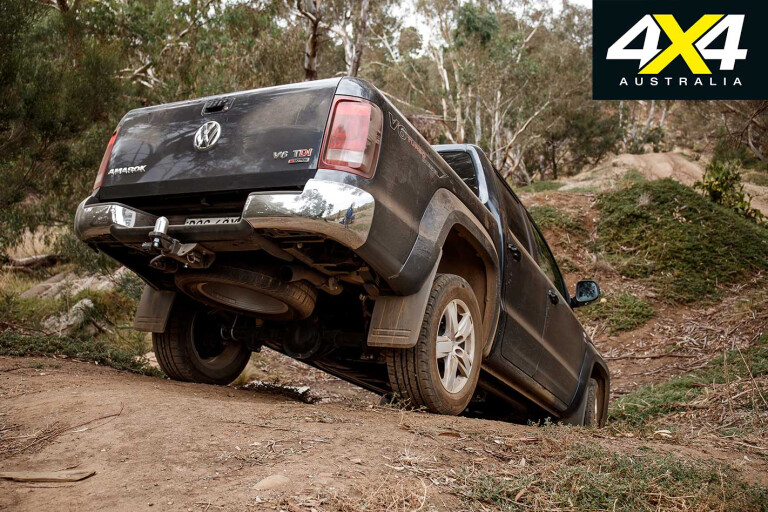
The Amarok’s strong off-road performance also comes off the back of its relatively long-travel suspension, and if you get into difficulty a rear diff-lock keeps the traction control on the front wheels active. Another box ticked. Good vision from the driver’s seat and a ‘clean’ underside are other off-road positives.
The only chink in the Amarok’s off-road armoury is the engine air intake being located in the engine bay, which makes the Amarok the first candidate for a snorkel (or a tarp).
LOAD CARRYING
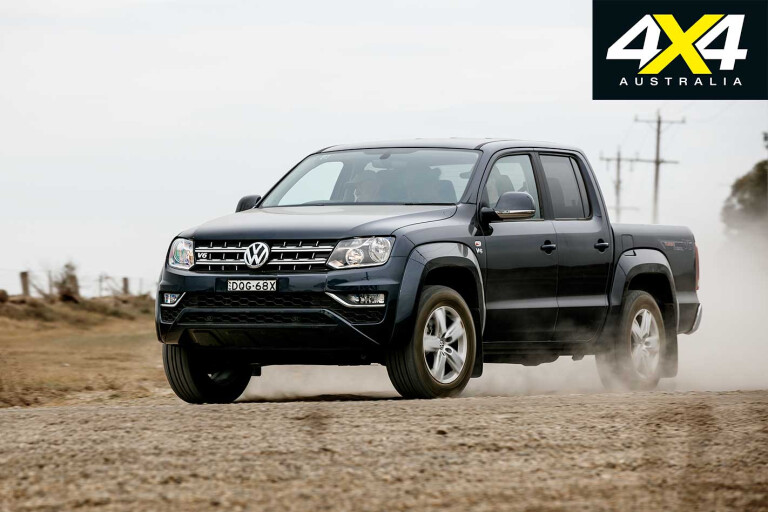
CLASS-LEADING torque is the best way to cope with heavy loads, and the Amarok’s engine dispensed with the 900kg payload easier than any engine here. In fact, it hardly felt it. Good performance from the chassis, too, when loaded to the maximum; although, it wasn’t as absolutely rock-steady as the Ranger.
No doubt the 550Nm would also help when towing the Amarok’s 3500kg tow limit, which matches the best here, while its 6000kg GCM matches Ranger, BT-50 and Colorado. The Sportline, being the lightest of the three Amarok V6s, also has a solid 1000kg payload figure.
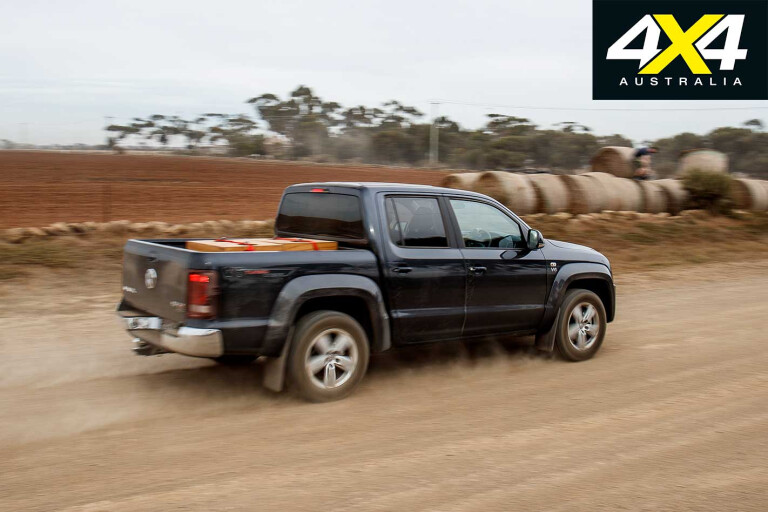
The Amarok’s tray is the only one here to fit a full-size pallet between the wheel arches, a very nice practical touch if you wish to have the looks and aero efficiency of a factory tub combined with some of the load-carrying practicality of an aftermarket tray. You have to wonder why the other ute manufacturers didn’t think of this?
All four of the Amarok’s tie-down hooks in the tub are also mounted low down, where common-sense tells you they should be. There’s also a work light above the tub and a 12-volt outlet, both practical features.
CABIN AND SAFETY
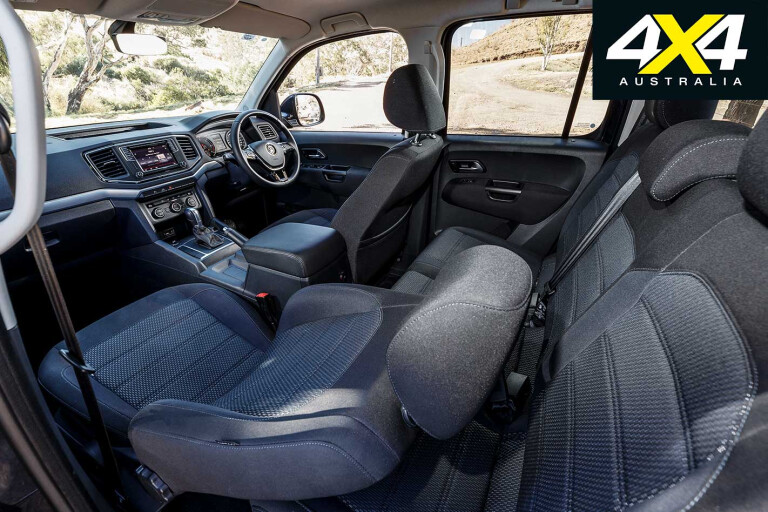
THE Amarok’s cabin is notably spacious (it’s the widest here), very well finished, and offers tilt-and-reach steering wheel adjustment for the driver. The width across the back seat is particularly good for three adults; although, the combined front-to-rear legroom is not as good as the Ranger or BT-50.
There are no airbags for rear-seat passengers; although, it still has a five-star ANCAP safety rating. No sat-nav at this spec level, either.
PRACTICALITIES
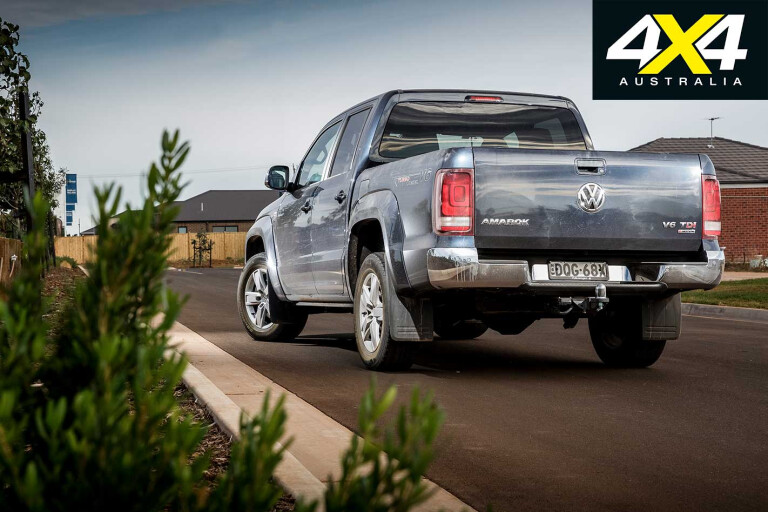
LACK of VW dealers in country areas isn’t ideal, and some independent workshops would prefer to service something else they are more familiar with. The long service intervals (12 month or 15,000km) do offset this to some extent.
Despite the V6 Amarok getting bigger front brakes than the four-cylinder models, you can still fit 17s to replace the factory 18s (or 19s on up-spec V6s) to open up your tyre choice.
Volkswagen Amarok V6 Specs
Engine: 3.0-litre V6 turbo-diesel
Power: 165kW+ at 2500-4500rpm
Torque: 550Nm at 1500-2500rpm
Gearbox: 8-speed auto
4X4 system: Single-range part-time
Crawl ratio: 17.4:1
Construction: Separate chassis
Front suspension: Independent/coil springs
Rear suspension: Live axle/leaf springs
Kerb weight: 2078kg
GVM: 3080kg
Payload: 1002kg
Towing capacity: 3500kg
Towball Download: 350kg
GCM: 6000kg
Fuel tank size: 80 litres
ADR fuel claim: 7.8L/100km
Test fuel use: 11.2L/100km
Touring range: 664km*
*Based on test fuel use, claimed fuel capacity and a 50km ‘safety’ margin
Acceleration and Braking
0-100km/h: 7.9sec
80-120km/h: 5.3sec
100-0km/h: 48.4m
Off-road capabilities
Departure angle: 23.6˚
Rampover angle: 23˚
Approach angle: 28˚
Wading depth: 500mm
Ground clearance: 192mm
Amarok V6 Prices**
Sportline: $55,990
Highline: $60,490
Ultimate: $68,490
**Prices do not include on-road costs
The Results
 Results and verdict
Results and verdict
Nine utes, but only one winner...
4X4 Australia Ute Mega Test
 Intro & Contenders
Intro & Contenders
Home of 4X4 Australia’s Ute Test, where we have put all of the popular 4x4 dual-cabs through their paces off-road and on-road.

COMMENTS